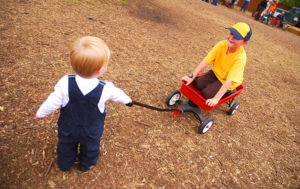
 Proprioception is one of our eight senses that sends information from the joints, muscles and connective tissues to the brain, providing body and spatial awareness. Our bodies receive proprioceptive feedback by lifting, pushing, and pulling heavy objects (also known as “heavy work”). A child can activate the proprioceptors by engaging in activities that compress the joints such as jumping on a trampoline or crashing into a cushion; or stretch the joints such as hanging from monkey bars or climbing a rock wall. Proprioceptive input can also be effective when applied to the jaw and musculature of the mouth with chewy tubes, sucking thick drinks through a straw, or chewing on crunchy foods. Below are some activities that toddlers can engage in when they appear to be seeking proprioceptive input. This often looks like difficulty sitting still, running back and forth across the room, crashing and rolling their body into objects or people, climbing on furniture, jumping off furniture, etc.
Proprioception is one of our eight senses that sends information from the joints, muscles and connective tissues to the brain, providing body and spatial awareness. Our bodies receive proprioceptive feedback by lifting, pushing, and pulling heavy objects (also known as “heavy work”). A child can activate the proprioceptors by engaging in activities that compress the joints such as jumping on a trampoline or crashing into a cushion; or stretch the joints such as hanging from monkey bars or climbing a rock wall. Proprioceptive input can also be effective when applied to the jaw and musculature of the mouth with chewy tubes, sucking thick drinks through a straw, or chewing on crunchy foods. Below are some activities that toddlers can engage in when they appear to be seeking proprioceptive input. This often looks like difficulty sitting still, running back and forth across the room, crashing and rolling their body into objects or people, climbing on furniture, jumping off furniture, etc.
- Jump on a trampoline or bouncy surface (couch cushions, a pile of large blankets, etc.)
- Push or pull baskets with heavy materials
- Carry around cushions or pillows
- Fill a pillowcase with stuffed animals and carry or push around
- Push or pull a heavy wagon or object with wheels
- Push a doll stroller or grocery cart full of objects
- Drink thick liquids through a straw
- Eat crunchy or chewy foods (carrot sticks, fruit snacks, jicama sticks, crackers, freeze dried fruit, etc.)
- Climb playground equipment
- Chew on a squishy tube or necklace
- Climb a “pillow mountain” on the ground or a set of stairs
- Find hidden treasures underneath a pile of blankets or pillows
- Play outside—running, jumping, climbing
- Help in the kitchen: stirring, kneading dough, carrying ingredients from the pantry to the counter, etc.
- Help with chores such as washing the windows, wiping down the table, pushing basket of laundry, pushing a mop, etc.
Providing the opportunity to engage in heavy work activities can decrease sensory seeking behaviors which may improve attention and engagement during daily routines activities, may reduce meltdowns or tantrums, can help children remain regulated through unexpected changes in their routine, and can help children settle before bedtime.
By: Chelsey Robinson, MS, OTR/L
Chelsey is an occupational therapist at Valley’s Children’s Therapy Clinic.

